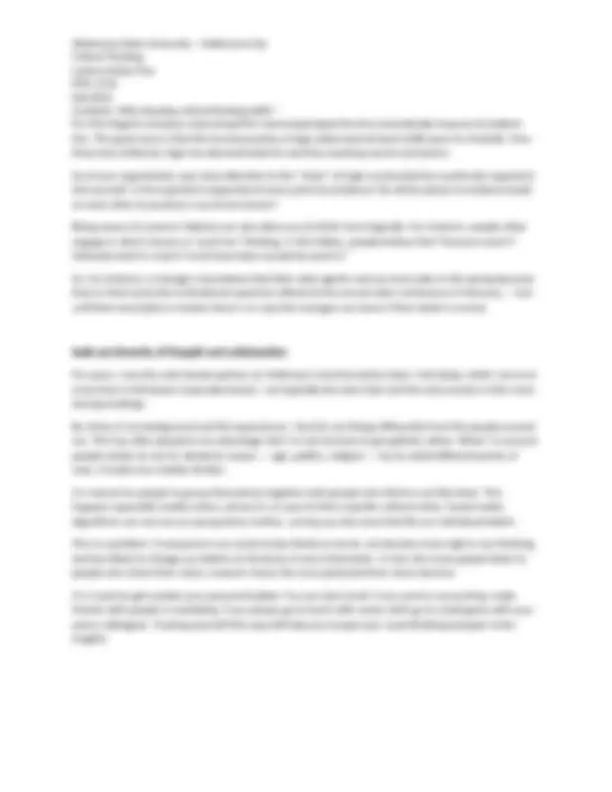



Study with the several resources on Docsity

Earn points by helping other students or get them with a premium plan


Prepare for your exams
Study with the several resources on Docsity

Earn points to download
Earn points by helping other students or get them with a premium plan
Community
Ask the community for help and clear up your study doubts
Discover the best universities in your country according to Docsity users
Free resources
Download our free guides on studying techniques, anxiety management strategies, and thesis advice from Docsity tutors
The importance of critical thinking skills in business leaders and how it can affect their organizations. It provides three simple habits that can be developed to improve critical thinking skills. The habits include questioning assumptions, reasoning through logic, and diversifying thought. The document also provides examples of how these habits can be applied in real-life situations. The author emphasizes that critical thinking is a learned skill and can be improved with deliberate practice.
Typology: Lecture notes
1 / 3

This page cannot be seen from the preview
Don't miss anything!


Critical Thinking Lecture Notes Five PHIL 1313 Fall 2022 Contents: Why develop critical thinking skills? Lecture Notes Five 3 Simple Habits to Improve Your Critical Thinking by Helen Lee Bouygues May 06, 2019 Summary. Too many business leaders are simply not reasoning through pressing issues, and it’s hurting their organizations. The good news is that critical thinking is a learned behavior. There are three simple things you can do to train...more A few years ago, a CEO assured me that his company was the market leader. “Clients will not leave for competitors,” he added. “It costs too much for them to switch.” Within weeks, the manufacturing giant Procter & Gamble elected not to renew its contract with the firm. The CEO was shocked — but he shouldn’t have been. For more than 20 years, I’ve helped struggling organizations. Sometimes they reach out because they have been mismanaged. Sometimes they have not stayed in front of changing technologies. In a few cases, members of the senior team were simply negligent. But in my experience, these organizational problems shared a root cause: A lack of critical thinking. Too many business leaders are simply not reasoning through pressing issues, taking the time to evaluate a topic from all sides. Leaders often jump to the first conclusion, whatever the evidence. Even worse, C- suite leaders will just choose the evidence that supports their prior beliefs. A lack of metacognition — or thinking about thinking — is also a major driver, making people simply overconfident. The good news is that critical thinking is a learned skill. To help people get better at it, I recently started the nonprofit Reboot Foundation. Based on my personal experience as well some of the work of our researchers, I’ve pulled together three simple things that you can do to improve your critical thinking skills: Question assumptions Reason through logic Diversify thought Now, you might be thinking, “I do that already.” And you probably do, but just not as deliberately and
Critical Thinking Lecture Notes Five PHIL 1313 Fall 2022 Contents: Why develop critical thinking skills? thoroughly as you could. Cultivating these three key habits of mind go a long way in helping you become better at an increasingly desired skill in the job market. Question assumptions When I work to turn around an organization, I’ll typically start by questioning the firm’s assumptions. I once visited dozens of stores of a retail chain, posing as a shopper. I soon discovered that the company had presumed that its customers had far more disposable income than they really had. This erroneous belief made the company overprice its clothing. They would have made millions more each year if they had sold lower-priced shirts and pants. Of course, it’s hard to question everything. Imagine going through your day asking yourself: Is the sky really blue? What if the person next to me isn’t my colleague but her twin sister? How do I really know that the economy won’t implode tomorrow? The first step in questioning assumptions, then, is figuring out when to question assumptions. Turns out, a questioning approach is particularly helpful when the stakes are high. So if you are in a discussion about long-term company strategy upon which years of effort and expense will be based, be sure to ask basic questions about your beliefs: How do you know that business will increase? What does the research say about your expectations about the future of the market? Have you taken time to step into the figurative shoes of your customers as a “secret shopper”? Another way to question your assumptions is to consider alternatives. You might ask: What if our clients changed? What if our suppliers went out of business? These sorts of questions help you gain new and important perspectives that help hone your thinking. Reason through logic Years ago, I took on the task of turning around the division of a large lingerie company. The growth of one of its major product lines had been declining for years. No one could figure out why. It turned out that the company had made the reasoning mistake of over-generalization, drawing a sweeping conclusion based on limited or insufficient evidence. Namely, the company believed that all of their international customers had similar preferences in lingerie. So it shipped the same styles of brassieres to every store across Europe. When my team started talking to staff and consumers, we realized that customers in different countries reported very distinct tastes and preferences. British women, for example, tended to buy lacy bras in bright colors. Italian women preferred beige bras, with no lace. And those in the United States led the world in sports bra purchases.